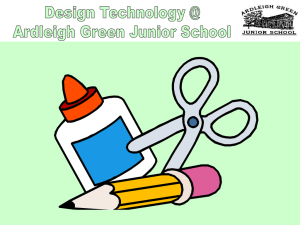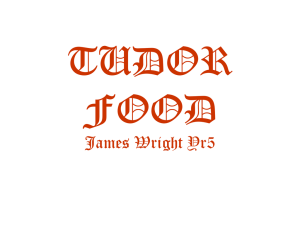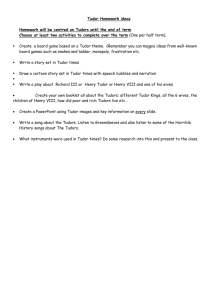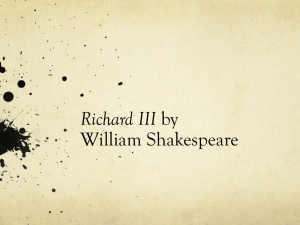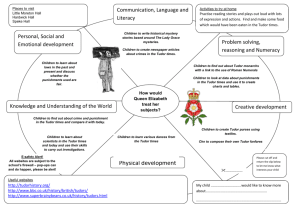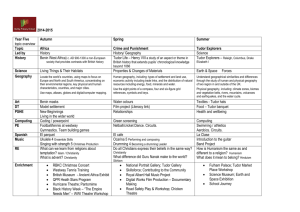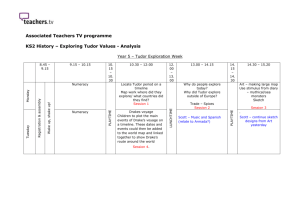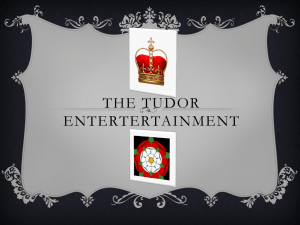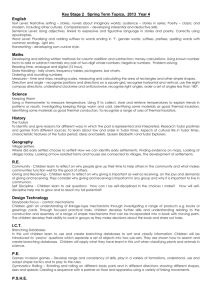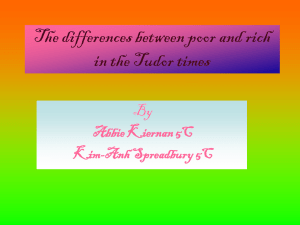Year 6 To Be or Not to Be!
advertisement
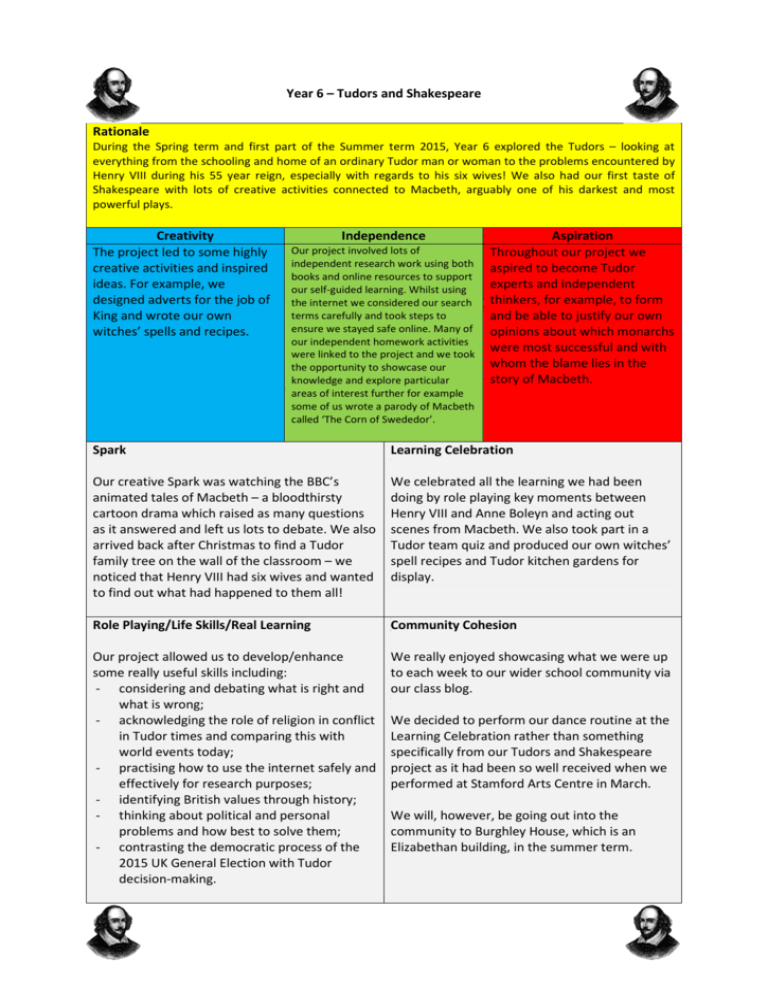
Year 6 – Tudors and Shakespeare Rationale Rationale During the Spring term and first part of the Summer term 2015, Year 6 explored the Tudors – looking at everything from the schooling and home of an ordinary Tudor man or woman to the problems encountered by Henry VIII during his 55 year reign, especially with regards to his six wives! We also had our first taste of Shakespeare with lots of creative activities connected to Macbeth, arguably one of his darkest and most powerful plays. Creativity Creativity The project led to some highly creative activities and inspired ideas. For example, we designed adverts for the job of Spark King and wrote our own witches’ spells and recipes. Independence Independence Aspiration Aspiration Our project involved lots of Throughout our project we independent research work using both aspired to become Tudor books and online resources to support experts and independent our self-guided learning. Whilst using thinkers, for example, to form the internet we considered our search Learning Celebration terms carefully and took steps to and be able to justify our own ensure we stayed safe online. Many of opinions about which monarchs our independent homework activities were most successful and with were linked to the project and we took whom the blame lies in the the opportunity to showcase our story of Macbeth. knowledge and explore particular Role Playing/Life Skills/Real Learning Community Cohesion areas of interest further for example some of us wrote a parody of Macbeth called ‘The Corn of Swededor’. Spark Out of Classroom Opportunities Our creative Spark was watching the BBC’s animated tales of Macbeth – a bloodthirsty cartoon drama which raised as many questions as it answered and left us lots to debate. We also arrived backand after Christmas to find a Tudor Computing E-safety family tree on the wall of the classroom – we noticed that Henry VIII had six wives and wanted to find out what had happened to them all! Learning Celebration Home Learning Activity We celebrated all the learning we had been doing by role playing key moments between Henry VIII and Anne Boleyn and acting out scenes from Macbeth. We also took part in a Tudor team quiz and produced our own witches’ spell recipes and Tudor kitchen gardens for display. Role Skills/Real Learning Links Playing/Life to discrete subjects: Literacy Maths RE MusicCommunity MFL PHSE Cohesion Our project allowed us to develop/enhance some really useful skills including: - considering and debating what is right and is wrong; Stepswhat to success - acknowledging the role of religion in conflict in Tudor times and comparing this with world events today; - practising how to use the internet safely and for research purposes; Howeffectively will the project be evaluated? - identifying British values through history; - thinking about political and personal problems and how best to solve them; - contrasting the democratic process of the 2015 UK General Election with Tudor decision-making. We really enjoyed showcasing what we were up to each week to our wider school community via our class blog. We decided to perform our dance routine at the Learning Celebration rather than something specifically from our Tudors and Shakespeare project as it had been so well received when we performed at Stamford Arts Centre in March. We will, however, be going out into the community to Burghley House, which is an Elizabethan building, in the summer term. Out of Classroom Opportunities Home Learning Activity - Lots of our homework was based around our Creative Curriculum project including: designing a job advert for a King/Queen; Tudor maths including working out what fraction of the Tudor period each monarch reigned for; a Tudor education reading comprehension; describing a Tudor home and who we thought it might belong to. We will be visiting Burghley House later in the summer term to see how it meets our expectations about a grand Tudor home. Computing and E-safety When carrying out research into the Tudor exploration and the life of Anne Boleyn, pupils used the internet to search for websites effectively. They had to be discerning in evaluating the content found and cross-reference information from a number of sources to ensure its validity. There was a strong focus throughout on the need to stay safe online and how to escalate any situations which gave cause for concern. Links to discrete subjects: English/Literacy - our topic gave rise to a variety of literacy challenges including: designing a job advert for a King; practising our handwriting with some poems about Edward VI; a piece of persuasive writing persuading the teachers to buy a Tudor house; completing a reading comprehension task on Tudor education; sorting fact, fiction and opinion about Henry VIII; imaginative writing about what it would have been like to be a Tudor monarch; reading and debating the issues arising from the story of Macbeth; examining the language and poetic devices used and creating spell poems using the witches’ spell as our stimulus. We used our drama skills to help us enact a scene between Henry VIII and Anne Boleyn before her death, to read the play of Macbeth as a class group and to rehearse a theatrical rendition of the witches’ spell in smaller groups and then perform these to the class. Clearly History played a major role in our project and we used our historical research skills to find out about Tudor exploration (drawing on the geographical understanding of continents and hemispheres plus latitude and longitude from our previous project) online in pairs. We explored a text from the period written by an Italian about Henry VIII and debated the problems that occurred during his reign as well as suggesting possible solutions to these. We used our reading comprehension skills in an historical context to answer questions about Jane Seymour and Edward VI. We also examined a painting of Anne Boleyn and learned about what she is wearing, its cultural significance and how it reflects the fashions of the time. We became experts into what happened to each of Henry VIII’s wives and why (we used a rhyme to help us remember!) and did some independent investigative work to put together the Tudor royal family tree. Finally, we took part in a fact-finding carousel to gather information about Elizabethan England and the life of Shakespeare. Art & Design – we created self-portraits of ourselves in Tudor fashion – with pale skin, ruffs, jewels and beards. We also made Tudor Roses after learning about the Wars of the Roses. Maths – Maths played a role in our project through some Tudor-themed puzzles and challenges including working out how long the reign of each monarch was as a fraction of the whole period. We also planted a kitchen garden like they would have had at large Tudor homes in Tudor times to maximise space and money. British Values The dictatorial approach of the Tudor monarchs gave us an excellent springboard from which to discuss how politics and attitudes have changed. We compared the way laws were passed in Tudor times with the democratic process that we have today, tying this in with the UK General election which took place towards the end of this project. We also discussed what is and is not acceptable behaviour and the need for tolerance and respect towards others that we perceive as ‘different’ (in contrast to Henry VIII’s response of chopping off their heads! ) Our work on Macbeth allowed us to debate the principles of right and wrong, the ideas of blame and revenge and how these link in with current British Values. Steps to success 1.) Historical backdrop: we explored the Wars of the Roses and the reign of each Tudor monarch up to and including Elizabeth I. We imagined what it would be like to be a King or Queen and how best they could have responded to the problems that occurred during each of their reigns especially regarding Henry VIII’s wives. 2.) Life in Tudor England: we looked at how people lived during Tudor times including their houses, their education and their religious beliefs. 3.) Macbeth: we were introduced to Shakespeare and examined the language and story of Macbeth, debating the motivations of the characters and the question of who is to blame. Project evaluation The children engaged creatively with the teacher-initiated activities in the early stages and had lots to contribute to class discussions about the lives of the Tudor monarchs and events in Macbeth in particular. The questions of right and wrong in respect of the fate of Henry VIII’s wives and in the play fired their imaginations and they demonstrated some impressive independent thinking skills. Two children even took the initiative to write a witty parody of Macbeth which they entitled ‘The Corn of Swededor’. The children were not deterred by the Shakespearean language and enjoyed trying to find modern-day equivalents. Inevitably some of their observations during the project were anachronistic but the children nevertheless gained a deeper appreciation of change and progress over time and a sense of the chronology of this period in British history. They also developed real-life skills during the project, such as the ability to write persuasively and demonstrate empathy. The project covered a number of elements of the Upper KS2 National Curriculum for non-core subjects and facilitated cross-curricular links to create a holistic learning experience.
